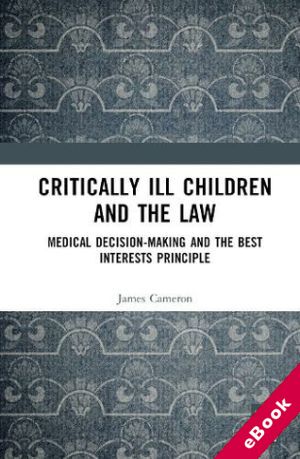
The device(s) you use to access the eBook content must be authorized with an Adobe ID before you download the product otherwise it will fail to register correctly.
For further information see https://www.wildy.com/ebook-formats
Once the order is confirmed an automated e-mail will be sent to you to allow you to download the eBook.
All eBooks are supplied firm sale and cannot be returned. If you believe there is a fault with your eBook then contact us on ebooks@wildy.com and we will help in resolving the issue. This does not affect your statutory rights.
A series of recent high-profile court cases has demonstrated the inadequacy of current laws in addressing issues relating to medical treatment decisions involving seriously ill children. The challenges of determining that life-sustaining medical treatment is not in a young child’s best interests have resulted in criticism of the best interests principle.
This book explores the theoretical foundations of the best interests principle, and alternatives offered in the academic literature, to allow readers to understand why the principle remains contentious despite its prevalence. It provides theoretical background, exploration of what occurs in practice, and proposes a novel approach to address these challenges. Frameworks for decision-making identified in the academic literature are used to examine the application of the best interests principle in practice in England and Wales, Australia, and New Zealand through a review of the case law and qualitative research with paediatric doctors. The exploration of current practice allows readers to understand the challenges of applying the best interests principle, but also the need to retain a focus on the child. Readers are introduced to a human-rights based approach, which ensures that the focus remains on upholding the child’s best interests but also provides a more comprehensive explanation of the situation.
Progressing the debate around end-of-life decision-making and children, the book will be a valuable resource for academics, researchers and policy-makers. It will also provide practical guidance to both legal and medical practitioners in managing disputes about the provision of life-sustaining treatment.